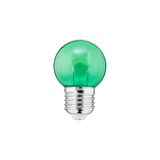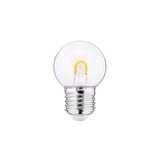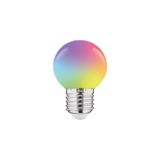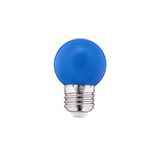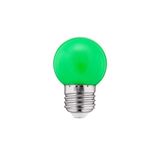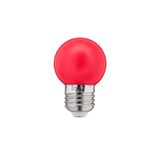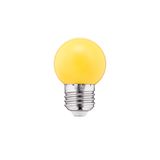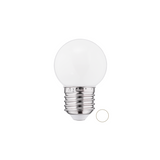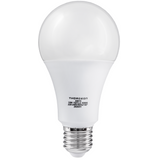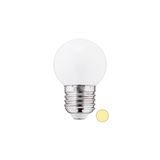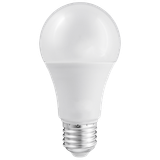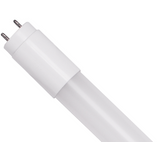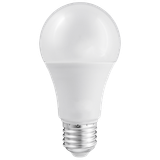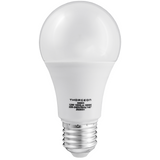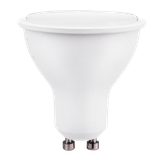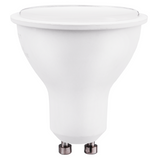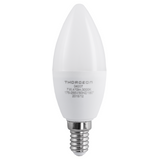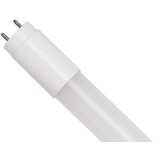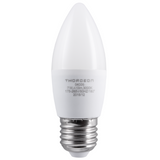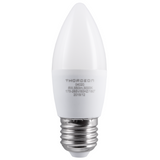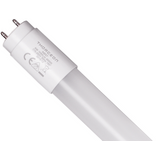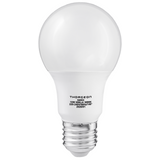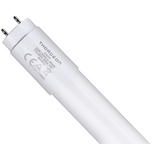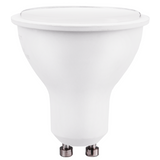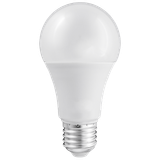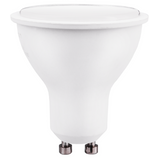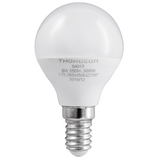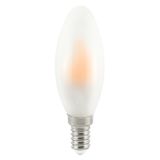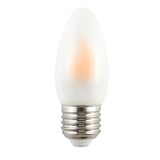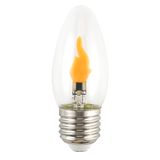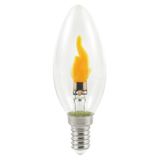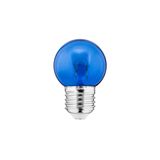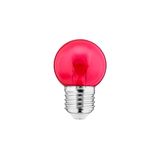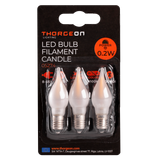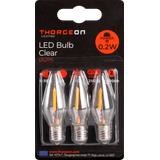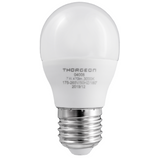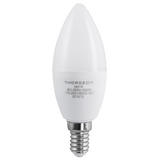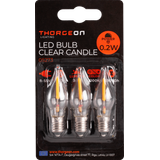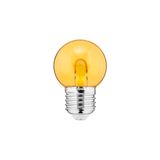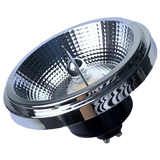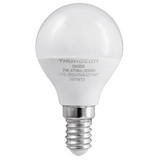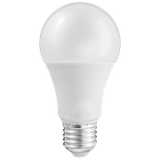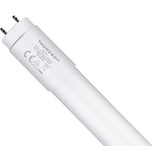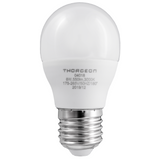THORGEON LED lamps and tubes
LED Tube 9W T8 840 900lm 600mm
LED Tube 18W T8 840 1800lm 1200mm
LED Tube 9W T8 840 1080lm 600mm
LED Tube 22W T8 840 2640lm 1500mm
LED Light bulb 5W GU10 4000K 400lm
LED Light bulb 5W GU10 3000K 400lm
-
-
1
- 2
-
thorgeon led lamps for commercial interiors
Project teams specify thorgeon led lamps when they want consistent photometry and identical footprints across floors. Typical outputs span 350–1,200 lm in A60, P45, MR16, and GU10 formats; CCT 2700–4000 K with SDCM ≤3 keeps colour uniform in open offices; CRI 80 as standard with CRI 90 options for retail task zones. Power factor ≥0.9 and THD <15 % support dense boards. Thermal design holds lumen maintenance L80 25–50k h from LM-80/TM-21 data when fittings run within −20…+40 °C.
thorgeon led bulbs range and optical performance
The thorgeon led bulbs portfolio covers E27/E14 cap bases per IEC 62560 and GU10 per IEC 60399, with clear or opal optics and 24°/36°/60° beams. UGR planning is straightforward: downlights keep ≤19 with 36° beams at standard ceiling heights, while corridors use 60° for uniformity. Startup <0.5 s and flicker percentage <10 % suit camera-heavy sites. Installers favour thorgeon led bulbs because body diameters and neck lengths match legacy trims, so bezels and gaskets don’t change.
thorgeon energy saving lamps metrics installers care about
Energy per circuit is predictable: 3.5–8 W replacements for legacy 25–60 W lamps, efficacy 90–120 lm/W depending on beam and CCT. Surge immunity 1–2 kV line-to-line protects against switching spikes in mixed boards. Marking is solvent-resistant for plant rooms. When schedules repeat, thorgeon energy saving lamps lock part codes by lumen bin and colour so cartons arrive pre-counted; keeping the same thorgeon energy saving lamps across room bundles stabilises commissioning time.
thorgeon dimmable led lighting control and drivers
Phase-cut versions track leading or trailing edge; specify trailing edge to reduce acoustic noise and step artefacts on long circuits. Where controls are centralised, 0–10 V and DALI drivers keep minimum levels consistent across runs. Document dimming floor (typically 5–10 %) and curve type so scene recall is repeatable. In mixed estates, thorgeon dimmable led lighting with CRI-matched SKUs avoids perceptible shifts between rooms; maintenance teams stock thorgeon dimmable led lighting by CCT, base, and control method.
thorgeon decorative led lights for hospitality and retail
Filament-style and tinted glass options maintain the look of tungsten while meeting energy targets. Amber 2200 K pieces calm lobby spaces; 2700–3000 K works for dining and boutique retail. Clear bulbs pair with low-glare cages; opal versions hide point sources behind diffusers. Specifiers choose thorgeon decorative led lights where the same cap/base and envelope must fit heritage fixtures; documented photometry keeps thorgeon decorative led lights within local glare limits.
thorgeon retrofit led bulbs compatibility and sockets
GU10 mains variants fit shallow cans; GU5.3 MR16 run 12 V AC/DC—confirm transformer minimum load or swap to LED-rated units to avoid shimmer. E27/E14 collars and spacer rings correct uneven plaster and protect IP in damp rooms. For enclosed luminaires, check Tc at trim; many thorgeon retrofit led bulbs specify max ambient 35–40 °C in sealed cups. Using thorgeon retrofit led bulbs with matched ferrules and torque notes preserves IP54/IP65 through service cycles.
thorgeon indoor led lamps applications and logistics
Apartments and hotels standardise hallway and room sets at 2700–3000 K; offices prefer 3000–4000 K with tighter SDCM. Emergency circuits use maintained GU10 SKUs with tested inverters; signage demands beam uniformity over 60°. Car parks and plant rooms require IP54/IP65 fixtures—lamps stay IP20 but must preserve the enclosure rating via proper gaskets. Procurement tags thorgeon indoor led lamps by lumen class, beam, and cap so cartons are room-bundled; the same thorgeon indoor led lamps are then repeated across floors without re-engineering.
Product range and series overview
- A-shape and candle bodies with opal or clear optics, CRI 80/90, 2700/3000/4000 K, 220–240 V AC or 12 V AC/DC.
- GU10 and MR16 spot sources with 24°/36°/60° beams, flicker <10 %, PF ≥0.9, surge 1–2 kV.
- Filament décor variants in 2200–2700 K for hospitality, dimmable on trailing-edge or DALI via dedicated drivers.
- Accessories: collars, spacer rings, and gasket kits to maintain bezel plane and enclosure IP.
Technical specifications and standards for engineers
Caps and dimensions follow IEC 62560/IEC 60399; safety and performance align to EN 62560 and EN 62031; EMC per EN 55015 with immunity per EN 61547. Operating window −20…+40 °C; storage to +60 °C. Mark typical lifetime as L80B10 at 25–50k h with TM-21 projection; colour stability SDCM ≤3; ripple current managed to keep PstLM within lighting guidelines where specified.
Applications and compatibility
Open offices, corridors, hotel rooms, and retail perimeters benefit from identical pitch and beam families across floors. Keep SELV and mains lanes separate in junctions; land shields 360° at entry plates where drivers sit nearby. For dimming, publish tested dimmer/driver pairs on the drawing; for emergency, declare lumen at 1 h to avoid inspection failures.
Selection criteria for B2B buyers
Fix CCT and CRI by space type; lock lumen class and beam angle by ceiling height and spacing. Choose control method early—phase-cut vs 0–10 V vs DALI—and record minimum level and curve. Validate transformer/dimmer compatibility on a pilot room. Confirm envelope and collar depth against trims; capture torque, ferrule, and gasket data for acceptance tests.
Advantages of working with Bankoflamps
We build deliveries around room schedules, not catalogue order. Quotes with EAN/MPN land in about an hour and live EU stock is visible before crews are booked. Your portal shows lead times, shipment progress, and downloadable price files with validity windows you can actually plan around. Trusted accounts use post-payment up to 30 days. We consolidate per room bundle so caps, beams, gaskets, and control gear arrive together, and your manager cross-checks lumen class, CCT/CRI, dimmer lists, collar depth, and IP stack against your drawings—keeping lighting kits site-ready across France, the Baltics, Germany, Spain, Italy, Belgium, and the Netherlands.
